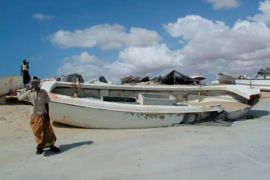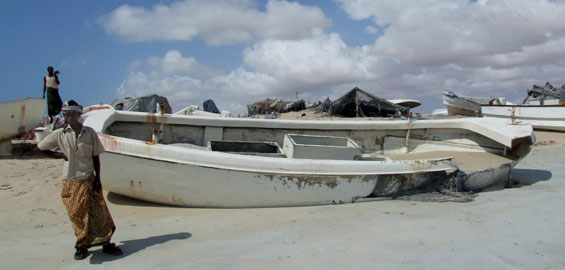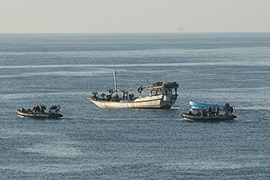Q&A: Piracy in the Gulf of Aden
Piracy pushes up costs as vessels come under attack off the coast of Somalia.

 |
| Many pirates say they were fishermen before turning to crime [File: EPA] |
Who are the pirates?
Somalia’s pirates are heavily armed groups operating out of ports along the largely lawless coasts of Somalia and its semi-autonomous region of Puntland.
The area is incredibly poor and some of the pirates told Al Jazeera that they were fishermen before turning to crime after international fishing vessels plundered their waters and toxic waste further damaged the industry.
But now the huge ransoms paid by the ship owners for the return of vessels have brought wealth to the port towns, in vast contrast to other areas of the country where 2.5 million people need humanitarian aid, according to UN estimates.
Villas have sprung up along the coast and new vehicles can be seen on the roads, all paid for by the ransoms.
Some of the pirates have accomplices in other countries, such as the United Arab Emirates and Kenya, where the ransoms are paid into foreign bank accounts or in cash to middlemen.
How do they carry out their attacks?
The pirate attacks have developed from relatively unsophisticated raids on fishing trawlers to boarding large cargo ships, and now even a huge oil tanker. The pirates have begun using satellite tracking devices, heavy weaponry and intelligence picked up from sources in ports.
The gangs usually approach a vessel in speedboats from the stern before throwing grappelling hooks tied to rope ladders over the side so they can board.
They are armed with rifles and rocket-propelled grenades to prevent the crew from fighting back or attempting to flee.
In many cases, such as the seizure of the Saudi-owned Sirius Star, analysts believe that a “mother ship” – often a captured fishing trawler – is used to carry the pirates hundreds of kilometres out to sea before they attack in smaller, faster speedboats.
Roger Middleton, a consultant researcher for London-based think-tank Chatham House, said the attack on the Sirius Star out in the Indian Ocean was possibly the most audacious so far.
“This is incredibly far from Somalia… It puts a huge ring around Somalia where it isn’t safe for international shipping,” he said.
What is the cost of piracy?
About $100 million is believed to have been paid in ransoms to the pirates this year, and the threat of hijack is pushing up the cost of insurance and, therefore, the price of goods.
Nearly 20,000 ships pass through the Gulf of Aden every year as it is the main trade route for dry and manufactured goods between Asia, Europe and the Americas.
 |
| The heavily-armed pirates use speedboats to pull alongside and board vessels [AFP] |
Seven per cent of the world’s oil production also passes through the area, according to Lloyd’s Maritime Intelligence Unit.
Cyrus Mody, manager of the International Maritime Bureau, said the hijackings had pushed up insurance premiums for vessel owners using the Gulf of Aden.
Some shipping companies, including the world’s largest tug operator, Svitzer, have decided that the benefits of passing through the Gulf of Aden to reach the Suez canal are not worth the risk and have decided to send there vessels around the southern tip of Africa.
This also pushes up the prices of goods as it adds at least three weeks to a typical journey, according to industry experts.
“Somebody is going to have to pay for that and it’s most likely going to be consumers in Europe and North America,” Roger Middleton, author of Piracy in Somalia: Threatening Global Trade, Feeding Local Wars, said.
Egypt will also suffer if traffic through the Suez canal slows as fees for the channel between the Red Sea and the Mediterranean are a major foreign currency earner.
Olivier Jakob, the managing director of Petromatrix, a Swiss-based independent research group specialised in the oil markets, said crude prices would be affected if the capture of the Sirius Star was not an isolated attack.
“We would see an oil impact only on a second hijack,” he said. “Up to now, it was the Suez route that was under pirate threat, but this attack was on the Cape route.”
Is anyone trying to stop the pirates?
The Nato military alliance dispatched vessels and European countries joined forces to set up a special unit aimed at securing a corridor for the busy shipping area after the Ukrainian-registered MV Faina was seized in September.
International navies have had a number of successes, preventing a number of hijackings and some suspected pirates are now on trial in Kenya.
But with them patrolling an area of about 6.6 million sq km, analysts have said that there will never be enough warships in the area to stop the attacks.
“These pirates are able to operate in deep water, so they’re a needle in a haystack,” Nick Davis, head of UK-based Anti-Piracy Maritime Security Solutions, said.
Matthew Oakley, director of the British maritime security Drum Cussac, told Al Jazeera that more pre-emptive action needed to be taken against the pirates by naval forces.
“I’m not advocating that you blow people out of the water unless you can be as categorically sure as possible that they are indeed bad guys, but I think it may make a difference, in due course, if some examples are made to these people of what the effects are going to be if they continue with this reprehensible behaviour,” he said.
The lack of effective government in Somalia adds to the difficulties in stopping the hijackings. Fighters opposed to the UN-backed transitional government control large areas of the country and there are near-daily attacks on the military.
Jason Alderwick, a maritime defence analyst at the International Institute for Strategic Studies, said: “Maritime security operations in that area are really only a sticking plaster, they are addressing the symptoms not the causes,”
“The TFG [transitional federal government] at the moment isn’t delivering on its state obligations to maintain the integrity of its own territorial waters. So they need a plan to facilitate that – or come up with another option.”
The government forced out the Islamic Courts Union, which had seized large areas of the south and centre of the country, in 2006. Under the courts’ control piracy had largely levelled off.